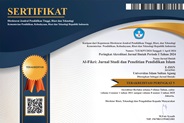STUDI KOMPARASI METODE IQRO’ DAN METODE SEPULUH JAM BELAJAR MEMBACA ALQURAN DALAM PEMBELAJARAN BACA TULIS ALQURAN
Abstract
Reading the Qur'an properly is an obligation for a Muslim. Therefore, every Muslim needs guidance in reading the Qur'an from an early age. However, reality shows that not a few adults are not able to read the Qur'an in accordance with the rules of recitation. In an effort to improve the ability to read and write al-Qur'an, the Institute for Islamic Studies and Practicing has used several methods, namely the Iqro method and the ten-hour of reading Qur’an learning method. This study aims to: first, determine the effectiveness of the Iqro and the ten-hour of reading Qur’an learning method on the reading and writing Qur’an ability of Faculty of Engineering students. Second, the difference in the influence of the two methods on the reading and writing Qur’an ability of Faculty of Engineering students. This study uses a quantitative approach with a different test technique using the Mann-Whitney test because the normality test shows abnormal data. The results showed that H1 was accepted, namely the Iqro method and the ten-hour reading Qur’an learning method significantly in improving the literacy skills of Faculty of Engineering students Muhammadiyah University, Yogyakarta. A comparison test between the two methods also shows that H1 is accepted, which is the ten-hour reading Qur’an learning method more significantly in improving the ability of reading and writing the Qur'an.
Â
Keywords: Iqro’ method, Ten-hour of reading Qur’an learning method, reading and writing Qur’an learning
Full Text:
PDFReferences
Anggranti, W. (2016). Penerapan Metode Pembelajaran Baca Tulis Al-Qur’an (Studi Deskriptif–Analitik di SMP Negeri 2 Tenggarong). Jurnal Intelegensia.
Fauzan, A. H. (2015). Pola Pembinaan Baca Tulis Al-Qur’an (BTQ) Sebagai Upaya Peningkatkan Kemampuan Membaca Al-Quran. Ar Risalah: Media Keislaman, Pendidikan Dan Hukum Islam, 15(1), 19–29.
Gafur, A. (2013). KAJIAN METODE PEMBELAJARAN BACA TULIS AL QUR’AN DALAM PERSPEKTIF MULTIPLE IN℡LIGENCES. Madrasah: Jurnal Pendidikan Dan Pembelajaran Dasar, 5(1).
Iqbal, A. M. (2015). Pemikiran Pendidikan Islam (Imam Ahmad Ibnu Nizar, Ed.). Yogyakarta: Pustaka Pelajar.
Izzan, A., & Saehudin. (2016). Hadis Pendidikan. Bandung: Humaniora.
LPPI. (2017). Panduan Pembudayaan Tadarus Al-Qur’an. Yogyakarta: LPPI.
Mindarningtias, C. (2010). Studi komparasi keberhasilan membaca al-Qur’an antara santri yang belajar dengan metode Qiroati di TPQ Miftahul Huda Ngaliyan dengan santri yang belajar dengan metode Iqro’di TPQ Al-Fattah Purwoyoso Semarang (PhD Thesis). IAIN Walisongo.
Ramayulis. (2015). Filsafat Pendidikan Islam. Jakarta: Kalam Mulia.
DOI: https://dx.doi.org/10.30659/jspi.v3i2.5074
Refbacks
- There are currently no refbacks.
Al-Fikri is published by the Department of Islamic Religious Education, Faculty of Islamic Studies, Universitas Islam Sultan Agung, Semarang, Indonesia.

This work is licensed under a Creative Commons Attribution 4.0 International License








